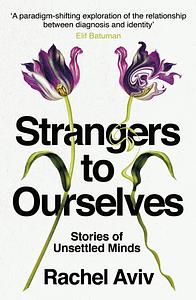Take a photo of a barcode or cover
informative
reflective
medium-paced
challenging
informative
reflective
sad
medium-paced
Started off slow and picked up when they talked about Naomi and Laura. Gave me a better understanding of mental illness and an appreciation for what people go through with living this life with depression, anorexia, multiple personalities etc.
Wow. Haunting. Fascinating. I did skip over a few sections. But really enjoyed others. The prologue and epilogue were especially interesting.
A few clips:
For a child, there are limits to the ways that despair can be communicated. Culture shapes the scripts that expressions of distress will follow. In both anorexia and resignation syndrome, children embody anger and a sense of powerlessness by refusing food, one of the few methods of protest available to them. Experts tell these children that they are behaving in a recognizable way that has a label, children then make adjustments, conscious and unconscious, to the way they've been classified. Over time, a willed pattern of behavior becomes increasingly involuntary and ingrained.
A new diagnosis can change the space of possibilities for personhood.
Pascal's wager.
Mental illnesses are often seen as chronic and intractable forces that take over our lives. But I wonder how much the stories we tell about them, especially in the beginning, can shape their course. People can feel freed by these stories, but they can also get stuck in them.
There are stories that save us, and stories that trap us. And in the midst of an illness, it can be very hard to know which is which. Psychiatrists know remarkably little about why some people with mental illness recover and others with the same diagnosis go on to have an illness career.
I have always been drawn to the genre of the case study, while also bristling at the picture it presents of a closed world, limited to one person and one explanation. I wonder if those of us that write about mental illness have to often taken our cues from psychiatry. Stories about psychiatric illness are often deeply individual, the pathology emerges from within, and is endured that way too, but these stories neglect where and how people live, and the ways their identity becomes a reflection of how others see them. Our illnesses are not just contained in our skull, but are also made and sustained by our relationships and communities.
Insight: The correct attitude towards a morbid change in oneself. A patient with the correct attitude recognizes, for instance, that spirits of dead people are not suddenly talking to her. Rather, the voices are symptoms that medication can silence. Insight is assessed every time psychiatric patients are hospitalized. And it looms large in decisions to treat them against their will. But the concept largely ignores that the "correct attitude" depends on culture, race, ethnicity, and faith. Studies show that POC are rated as lacking in insight more often than those who are white. Perhaps because doctors find there mode of expressing distress unfamiliar, or because these patients have less reason to trust what their doctors say.
A few clips:
For a child, there are limits to the ways that despair can be communicated. Culture shapes the scripts that expressions of distress will follow. In both anorexia and resignation syndrome, children embody anger and a sense of powerlessness by refusing food, one of the few methods of protest available to them. Experts tell these children that they are behaving in a recognizable way that has a label, children then make adjustments, conscious and unconscious, to the way they've been classified. Over time, a willed pattern of behavior becomes increasingly involuntary and ingrained.
A new diagnosis can change the space of possibilities for personhood.
Pascal's wager.
Mental illnesses are often seen as chronic and intractable forces that take over our lives. But I wonder how much the stories we tell about them, especially in the beginning, can shape their course. People can feel freed by these stories, but they can also get stuck in them.
There are stories that save us, and stories that trap us. And in the midst of an illness, it can be very hard to know which is which. Psychiatrists know remarkably little about why some people with mental illness recover and others with the same diagnosis go on to have an illness career.
I have always been drawn to the genre of the case study, while also bristling at the picture it presents of a closed world, limited to one person and one explanation. I wonder if those of us that write about mental illness have to often taken our cues from psychiatry. Stories about psychiatric illness are often deeply individual, the pathology emerges from within, and is endured that way too, but these stories neglect where and how people live, and the ways their identity becomes a reflection of how others see them. Our illnesses are not just contained in our skull, but are also made and sustained by our relationships and communities.
Insight: The correct attitude towards a morbid change in oneself. A patient with the correct attitude recognizes, for instance, that spirits of dead people are not suddenly talking to her. Rather, the voices are symptoms that medication can silence. Insight is assessed every time psychiatric patients are hospitalized. And it looms large in decisions to treat them against their will. But the concept largely ignores that the "correct attitude" depends on culture, race, ethnicity, and faith. Studies show that POC are rated as lacking in insight more often than those who are white. Perhaps because doctors find there mode of expressing distress unfamiliar, or because these patients have less reason to trust what their doctors say.
challenging
emotional
informative
reflective
sad
medium-paced
emotional
informative
reflective
medium-paced
challenging
emotional
informative
sad
medium-paced
A fascinating investigation of how the stories we tell and are told about our mental illnesses influence the treatments we receive and respond to and ultimately the trajectory of our lives.
emotional
informative
reflective
slow-paced
The stories are beautiful, beautifully told, and need telling, but there is a lack of there there.


